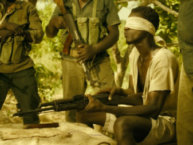
Pemi Aguda writes short stories and flash fiction. Her stories have appeared online and off – in literary journals and anthologies. Her short story “Caterer, Caterer” won the 2015 Writivism Short Story Prize; published in Munyori Journal and the Roses for Betty anthology
Help Jimi Help Himself
You crack the door open and the room turns silent. You push the door wider to find them all staring at you. Your eyes find the ground; and then you lift them back up- to the familiar downturn of your father’s lips. They etch a sad curve in his wrinkled face and his eyes look straight into you, assuring you of the part you have played in carving happiness out of his face.
“Good evening,” you say as your knees lower to rest on the thinning green rug. This position reminds you of younger years and scolding and punishment and oh, the childish eloquence when defending your little brother. These old feelings have found you kneeling again in your father’s house and they stir again in your chest, twenty years later – because you know Jimi is the reason they have called you.
“Eehehn, welcome. Sit down, Jumoke.” It is your Uncle Dele that speaks first. You watch your father’s brothers shuffle in their seats and settle with their knees pointing towards you. Your father himself remains silent; no greeting can wipe away your two years of absence. Uncle Dele waits for you to be enveloped in one of the throne-like armchairs that are arranged in a semi-circle facing the TV console. The TV is off.
“How is Lagos?” It is Uncle Leye that speaks now. He looks like he has been crying. You wonder if Jimi has died. But no, you are sure you would know. Somewhere behind your ribs would have squeezed and collapsed inside of you. You would know.
Your eyes fly back to your father’s but he is no longer looking at you. His eyes are staring off to an abstract point in the horizon behind your head.
“Fine, sir.“ You say nothing else, unwilling to ask the reasons for your summons.
“It is Jimi,” Uncle Peju confirms what you already know. “Something has happened.”
You remain silent. You stare at your knuckles, the hairs that have struggled to grow like plants in a desert.
“Jumoke?”
“Sir?”
“Look at me when I am talking to you.”
You raise your eyes to meet Uncle Peju’s rheumy eyes. He leans forward and the chair creaks.
“There was an ah..”
“..incident,” Uncle Leye interjects.
“Yes, incident. In the village.”
“You know we took Jimi away for a while…” Uncle Diran adds his voice.
“Yes, yes. We thought if he stayed with Mama Agba for a while..”
“…he would get better.”
“Or at least, bring less shame upon us,” Uncle Remi says. They all fall silent after this.
Then continue:
“Well, yes. But mostly, we thought if he stayed away from his…”
“..drugs.”
“Yes, drugs… and his enablers..”
“..in a serene environment; he would get better.”
“But, ah…”
“Well, Jumoke, you know a little bit about science. What withdrawal does to one’s brain…”
“You mean, when the devil possesses a person?” It is Uncle Remi again.
Your eyes shift to his. They are big and bulgy. You can see the red distinct veins coalesce around the dark circles that stare unblinkingly down at you.
He is the one that finishes the tale. He tells you that your brother has killed a child. That he swore it was a demon sent to kill your grandma. That they were lucky it was Jajabile’s sickly son. The family accepted money, a lot of money, to keep quiet. But Jimi has to go away. But where will he go?
That your father has joined a political party, that they don’t want something like this waiting to be exploited.
He turns to your father here. But when your father remains silent, he swivels back to face you, inch by slow inch.
“We’ve found a way to umm, help Jimi help himself.” He clears his throat. “Quietly.Permanently.”
**
Your brother is coming to spend a night with you. You had settled on this finally after hours of weeping, calling your father’s family murderers and pleading for time. You are to have tonight with your brother then remit him back into the hands of your uncles. You have refused to have knowledge beyond this.
“There are places he can stay in Lagos,” you had said – fists clenched.
“With you?” Uncle Leye had asked; his query quiet and heavy. His words settled like lead on your shoulders. You stood, your ire allowing you forget to be respectful, to keep your tone even and reasonable when speaking to your elders.
“There are hospitals! There are rehabilitation centres. There are churches, uncle!”
“Who will pay? With your teacher salary?” Uncle Remi asked. His eyes had threatened to pop out at you. “This family is washing its hands off Jimi. We have suffered, Jumoke. This is murder that he has committed oh! Murder. He has advanced from armed robbery now.”
“But isn’t that your plan too?”
“Wo, we are only helping Jimi. His life is over as it is, Jumoke. Look! How long will you pay with your money, sweat and loyalty before you get tired? When you get married? When you have your own children? Do I have to remind you about all the sacrifices you have made because of this oniranu boy?”
He didn’t. The months of school you missed after your brother broke your arm in a violent fit still resurface as the red angel on your shoulder whenever you defend him.
“He has an illness, Uncle.” The argument rolled easily off your tongue; it tasted familiar and overused.
“An illness he brought upon himself. Don’t use drugs, konigbo’ran. He never listened… Even to you!”
“He’s my brother. That means something. I will never get tired of him. You will kill an innocent because of dirty politics?”
“This is hardly about the politics, Jumoke! Stop acting like a child, my dear. I told your father we should do this without you. He insisted. I don’t know since when we started consulting children to make decisions.”
It was then you realized that including you in this decided plot is your father’s punishment. For picking Jimi over him. For always defending your brother against the constant consternation of your father.
“He’s going to kill you the way he killed your mother.” You remember your father visiting you at the hospital, standing at the foot of your bed – pointing at the cast supporting your arm. “Jumoke, s’ogbo?He. Will. Kill. you.”
“Daddy, please stop saying that. You can’t blame Jimi for mummy dying. He didn’t do anything.”
“He was born. That was enough damage. She was never the same after she had him!”
“You’ve said this a million times, daddy. But he was a baby!”
“Don’t shout at me, young woman.” He had sighed, stepped closer. “Chief Lawanson will give you that internship, Jumoke. Go and finish school in America. Leave Jimi to me. I will deal with him.”
“No, daddy. I’m not going.”
So, now you are hiding your knives and shaving sticks. You are throwing out every packet of Panadol and Felvin and Ibruprofen you can find. You have turned off your gas. You are making your home Jimi-proof. Anything could become a weapon easily. Tonight you will protect him from himself.
Uncle Diran’s driver drops him off and he is there standing before you – all tall frame of skin and bones and spotted skin and downcast eyes.
You wrap your hands around his belly. You ignore the jutting pelvic bone digging into you, you ignore the acrid smell of his clothes and you ignore the stillness of him inside of your hug – his arms limp and swaying like the empty hands of a scarecrow.
He follows you slowly into your small space. He walks past you at the door and stands still in the middle of your living room. He looks out of place against your frilly curtains and orange throw pillows and patterned rug – like a dead tree in a flourishing garden. You shake your head to dispel your morbid thoughts and start to fill the silence with your nervous chatter.
“So, I saw Kunle the other day. He asked after you. You know he was still talking about his mixtape?” His body remains still, opposite you; but his eyes flit around behind your head taking in the banality of your everyday intimacies. You wonder what he thinks. “Imagine? He’s still working on it sha…”
Your voice trails off because he has started to move; he is looking under your coffee table and underneath your sofa. A bony finger rises to shift aside your curtains then falls back to his side.
“Jimi, what are you looking for?”
He looks at you as if you are stupid. “The demons, of course. Are they here?”
And then you are standing there and crying with your arms around your own self because you have never seen him like this – so weak and broken. You have seen him break a television and slam his guitar into a car window. You have seen him white-nosed with glazed eyes and that content smile slanting his lips that look just like yours. You have seen him on edge, twisting a knife in front of your face until you had emptied your wallet into his hand. But never this frail minded boy convinced of a fictitious ‘they’.
There was a time your brother disgusted you; when the weight of the responsibility of him, of being the good child and substitute mother made your body heat up with wishes of an overdose that would end everybody’s misery. But you have always been a coward; even pusillanimous in the face of your own contempt. So that when his faceless friends had called you to come quickly because of that first overdose, you had spooked all the other passengers on the bus by loudly screaming “I take it back!” to God.
“Jumoke?” He is oblivious to your tears, waiting for your response. “Are they here?”
“No,” you eventually reply. “No, Jimi.”
Then you sit beside each other eating eba and okra on trays sitting on your knees staring at the News on your television with the volume turned down.
“Politics,” you whisper.
“What?” Jimi asks.
“Nothing.” And you swallow some eba to push back the lump in your throat.
“Jimi,” you begin. He is poking at his lump of eba with the same index finger. Stab. Stab. Stab. You look away. You had not thought beyond this point. Is this night with your brother really a goodbye? Will this be the last time you breathe the same air, share the mundane routine of eating together? Or can a revolutionary speech bring back the little boy who cried and begged to go to school with you and who told you first when he kissed Ada during PE? Surely, someone this calm wouldn’t hurt anybody?
“I miss mummy.” He says now, more to his plate than to you.
You laugh. It sounds brittle and painful; like it is breaking your ribs as it escapes your mouth. “You were two when mummy died, what do you remember?”
He looks at you that way again. “I saw her last week. What are you talking about?”
You turn back to the presenter on your TV screen; her eyes are off-kilt, obviously reading from a prompter.
“She doesn’t like me like this, Jumoke.”
“I don’t either.”
Stab. Stab. “Sorry.”
“You know, it doesn’t have to be..”
“I tried to stop, Jumoke. But I can’t. I found someone in the village who was giving me. I was taking grandma’s jewellery.”
“Oh.”
“Remember that time mummy came to pick me from the hospital when I OD-d and she bought me agbalumo and didn’t shout even though daddy almost killed me? Oh, and that time we went to stay in that resort for a weekend and daddy was looking for us?”
You don’t correct him. You do not tell him that was you. And that was you again. The scene on TV has changed to a politician shining a beatific smile while cutting an elaborate ribbon in front of a new building. ‘A New Beginning’, the caption reads.
“It’s that I don’t have any power over it that is even the worst. I used to be a strong guy. Remember those basketball days?” Stab. “Now, all my dignity is gone.”
You are surprised at his eloquence. It feeds you some hope. “Jimi,” you begin again.
“But what’s the point sef?” He interrupts. “If I’m honest with myself, there’s no point.”
And your hope plummets again, settling with the heavy meal in your belly. Because this is a familiar cycle. Promises of new beginnings followed closely by speeding disappointments that knock your breath out.
“Sometimes, I think of just going to the beach and drowning. At least, it would be something I have power over.” Jimi raises a hand to scratch his nose and it falls back to his lap in a lazy arc.
Your eyes slide away from his slack face and you wonder what power is in the hands of a boy with shaky fingers? Is it still power?
Later, when he has fallen asleep with his neck at an unnatural angle against the couch – his right foot jerking intermittently, you pick the trays and start to tidy up. You push the leftover food off the plate into the dustbin. You stare at the apples you were supposed to have after dinner. When you were little, before your mum died, you would beg her to let you dice them into little slices like her. But she was always scared you would cut yourself and so she never let you.
You reach for the knife you have hidden in the oven. Laying it beside one fat green apple, you return to the living room. You place your offering on a stool that you then drag beside your little brother’s leg. Closer. Closer. Close enough to be a question.
Then you press your lips that look so much like his against his wide forehead. Then you go to bed.





